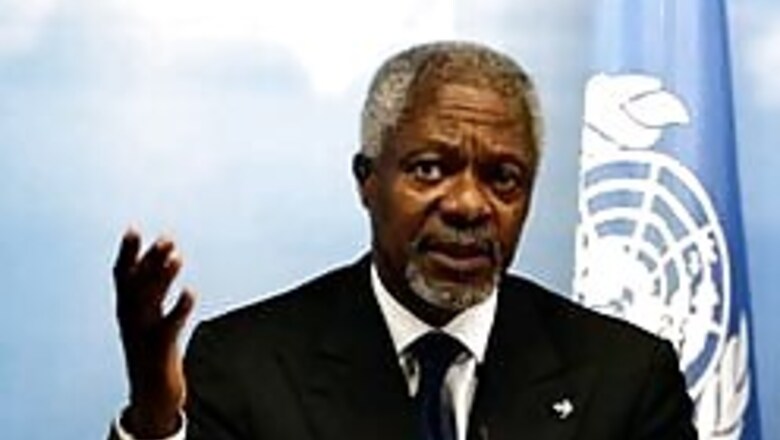
views
United Nations: UN Secretary-General Kofi Annan, who steps down on December 31 at the end of his second five-year term, has called for urgent steps to expand the 15-member Security Council to make it "more democratic" and "more representative."
"The world is not the world of 1945. If we really want to make this organisation what it ought to be, we need to reform the Council to make it more democratic, more representative. If we do that, the Council would even gain in greater legitimacy," he said.
In his address to a press conference on Wednesday, he also called on the Member States to move quickly to select his successor who will take over on January 1 next.
Five candidates including Indian nominee Shashi Tharoor, Jordanian Prince Zeid Hussein, South Korea's Foreign Minister Ban Ki-moon, Thailand's Deputy Prime Minister Surakiart Suthirathai and Sri Lanka's Jayantha Dhanapala are in the field.
The current indications are that the new incumbent would be selected early in October when Japan presides over the Security Council.
Annan said he has been encouraging member states to choose a new incumbent as soon as possible.
Asked about the priority issues he hoped to address in his remaining months in office, Annan cited Lebanon and the broader Middle East, Darfur, the Democratic Republic of Congo (DRC), Kosovo and the fight against HIV.
He called for expeditious action to implement Security Council resolution which ended the 34-day war in Lebanon and authorised an expanded UN force there.
"Quite honestly, when I look at what needs to be done and having been in the region and discussed this with everybody, I think with a bit of goodwill, reasonableness and hard work, this can be done within three to six months," Annan, who just returned from an intensive diplomatic tour of the region said.
"This would also send a message that resolutions dealing with peace in the Middle East can be implemented and help establish peace and stability between nations and borders and that we can build on from there and tackle Palestine and others," he noted.
Addressing his successors, he said, "The Secretary-General always needs the Member States, and you need to work with them. There are times when they lead, but there are times when the Secretary-General has to lead, become the general and lead them."
Even in those instances, he added, the Secretary-General cannot act alone. "The UN is its Member States, and so he or she has to find a way of working very effectively with them. I think what happened in Lebanon was a clear demonstration of what can happen when the Secretary-General and the Member States work very effectively together."
"The Secretary-General can do nothing if the Member States are not willing to help him, give him the means, support him and let him do it. So I hope my successor will develop these kind of relations with the leaders, with the countries, and to be able to work with them effectively," he said.



















Comments
0 comment